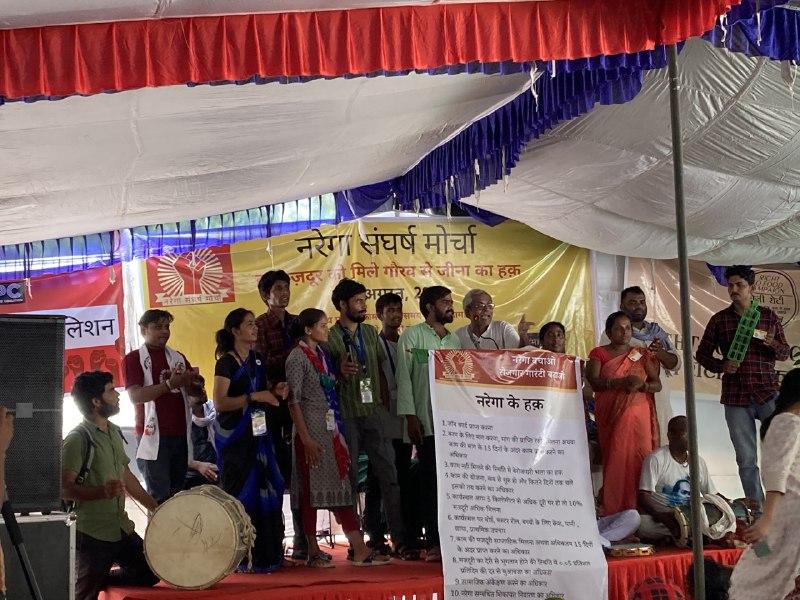
Rural workers from over 15 states will be staging a three-day protest at Jantar Mantar. Image clicked by Ronak Chhabra
New Delhi: Hundreds of rural workers from across the country gathered here at Jantar Mantar on Tuesday, as part of a three-day protest to press for adequate funding for the Mahatma Gandhi National Rural Employment Guarantee Act (MGNREGA) scheme.
The protest has been called by one NREGA Sangharsh Morcha, a national-level network of organisations and individuals deals with the employment guarantee act. Rural workers from over 15 states including Rajasthan, Uttar Pradesh, Bihar, West Bengal, Telangana, among others, participated in the demonstration on Tuesday.
The morcha argued that the crucial role played by MGNREGA scheme in supporting the rural population was highlighted during the Covid-19 pandemic, with demand for work under it remaining “high” even after two years.
“And yet, NREGA is under attack by the government. Consistently decreasing budgetary allocations, wage payments delayed for months, negligible compensation paid for delays, and woefully low wages plague NREGA. These issues are widespread across the country,” the group said in a press statement, issued on Tuesday.

The first day of protest was marked by the singing of protest songs, among other activities. Image clicked by Ronak Chhabra
Aimed to guarantee the ‘right to work’ in rural areas, MGNREGA is a scheme under which at least 100 days of wage employment in a financial year is provided to at least one member of every rural household whose adult members volunteer to do unskilled manual work.
Women are guaranteed one third of the jobs made available under the MGNREGA.
Despite proving to be a “lifeline” for many rural poor, especially during times of economic distress, the scheme’s budget provisioning has been significantly less than required, despite soaring demand for employment in recent years, numerous experts have observed.
According to them, this leads to untimely payment of wages to workers, compounding the woes of the latter due to “rampant fudging” in determining wages itself, owing to “corruption prevailing in multiple states.” As per the Act, workers must be paid within 15 days upon completion of a muster roll of work.
Shankar Singh of Rajasthan-based Mazdoor Kisan Shakti Sangathan (MKSS) told Newsclick on Monday that the delay in payment of wages was the biggest issue being faced by rural workers associated with MGNREGA across the country. “It only gets worse in the second half of each year as “inadequate” funds for the scheme runs dry,” he added.
In 2022-23, the Narendra Modi –led Central government has kept the budgetary allocation for MGNREGA at Rs. 73,000 crore, which is 25% lower than the previous year’s revised estimates at Rs. 98,000 crore.
Multiple media reports flagged that the scheme’s financial statement for 2021-22 already shows a negative net balance – meaning that a portion of the new allocation will only be used to clear the pending liabilities from previous years.
Nor surprisingly, the Peoples’ Action for Employment Guarantee (PAEG), a coming together of researchers and activists, in its MGNREGA scheme tracker for July this year highlighted that the Central government had already exhausted two-thirds of its scheme’s budget. “With eight months remaining, the pending dues are expected to increase,” the group said in its report.
The fund crunch for the MGNREGA scheme has come at a time when demand for work under the scheme has “shot up to unprecedented levels,” Apoorva, one among the coordinators of the morcha, told Newsclick on Tuesday. According to one report, nearly 31 million people sought work in June this year under the scheme, on the back of demand from 30 million people in May.
The same report added this year’s level was 43% more than the pre-pandemic (2015-2019) levels month of May.
Stagnating wages in real terms under the scheme – with them being lower than even the statutory minimum agricultural wages in 27 states and Union Territories – are another issue that was flagged by the rural workers through their demonstration on Tuesday.
Anuradha Talwar of Paschim Banga Khet Mazdoor Samiti told Newsclick that the morcha is demanding that the wages under the rural employment guarantee scheme must be immediately be made at par with respective states’ statutory minimum agricultural wages and rapidly move towards raising it at Rs. 800 per day.
“Given the rural distress in the country, we are also demanding that work days under the scheme must be raised to 200 across the country,” Talwar said.
On Tuesday, rural workers from various states also highlighted the distress that is being caused to them, owing to the recently introduced National Mobile Monitoring Software (NMMS) app – it was launched in May 2021 to ensure monitoring of the scheme and taking real-time attendance of workers at worksite.
“But it has only caused us trouble and nothing else,” rued Pramila Devi, a 40-year-old rural worker, hailing from Bihar’s Vaishali district. “Many a times, it doesn’t record our attendance because of poor network due to which the workers lose their wages. There is no attendance app for the officers and ministers, then why it is for the workers?” she asked.
Meanwhile, solidarity from political leaders and farmer leaders was extended to the rural workers, with Rajya Sabha Member and Communist Party of India (CPI) leader Binoy Vishwan and All India Kisan Sabha (AIKS) leader Hannan Mollah addressing the gathering here on Tuesday.
Emphasising the need to come together, the leaders demanded greater accountability from the government, while pressing for having discussions on the scheme during the ongoing Monsoon Session of Parliament.
Courtesy: Newsclick